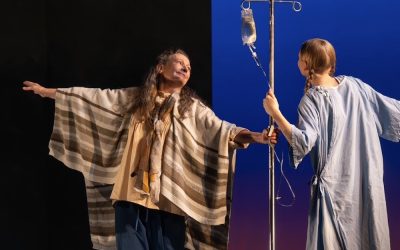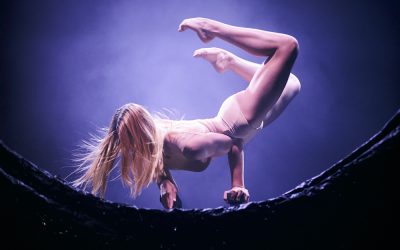Playwright Mohammad Yaghoubi’s Earworm is such an intriguing combination of elements. They didn’t all work for me, but they sure as hell kept me engaged.
The central relationship is between an Iranian-Canadian podcaster named Homa and her adult son Pendar, who lives with her in their Toronto apartment. But there’s conflict: Homa left Iran to escape the oppressiveness of the Islamic Republic, but now Pendar is in love with Fatemeh, whose father Mohammad is a religious conservative. Pendar tells Homa that, when she meets Mohammad, she’ll have to wear a hijab — which does not go over well with Homa.
Earworm is an odd combination of the comic, rhetorical, and melodramatic, but it’s all held together by an extraordinary level of sincerity — and serious intent, rooted, it seems, in an understanding of real-life experiences — which is most clearly felt in the unwavering naturalism of the performances.
In Act 1, words heavily outweigh action and, as written, both Homa and Pendar lean into absolutes about which behaviours are selfish, which are morally correct, what duties elders and youth owe each another, and so on. I’ve rarely encountered so much pure rhetoric in my Western-based theatrical experience or in my daily life; watching Earworm, I found myself longing for recognizably casual and nuanced dialogue — but my reaction might simply be about a lack of cultural familiarity.
And there are other elements, including the script’s comic sensibilities, that resonated more easily with me. The mother-son interaction is well-observed, for instance, funny, and instantly recognizable: Homa’s sly pushiness, Pendar’s use of passivity as a defence.
And there’s a baseline of affecting emotion, mostly in the ways playwright Yaghoubi explores the oppression of women in the Islamic Republic. Homa tells us that, as soon as she started menstruating, she learned to be ashamed of her period. As she matured, her resentment at the erasure of her femaleness deepened: “I’ve hated the mandatory hijab since I was 18.” Homa describes the suffocating nature of misogynistic oppression in visceral terms, including in a passage about a young woman’s suicide.
Act 2 takes a decidedly more physically active — and melodramatic — turn as the specific horrors of Homa’s personal experiences in Iran return to haunt her in Canada.
I’m not using the word melodramatic in a pejorative sense here; I’m simply saying that the plot development and emotions take some very wide swings. As I said earlier, this emotional size is all held together by the authoritative naturalism that the cast delivers under playwright Yaghoubi’s direction.
Aida Keykhaii delivers a charismatic and multifaceted performance as Homa. She’s a star in my opinion. Playing Pendar, Amir Maghami finds comedy and pathos while keeping things impressively close to the chest. Parya Heravi (Fatemeh) possesses an extraordinarily musical voice — it’s like a cello — and she, too, handles some very big emotions without looking like a fool, which is not an easy thing to do. Amir Zavosh’s velvety delivery as Mohammad lends the character just the right degree of unknowability.
It’s important to know that this production is metatheatrical on several levels, with varying degrees of success. The first couple of times actors break the fourth wall to directly address the audience work well enough, but, because they’re not dramatically crucial, they feel a bit gimmicky. Still, the final application of this strategy is moving: Heravi, who’s playing Fatemeh tells us that the harrowing scene we’ve just witnessed requires a response because it gives the debilitating fear-mongering of the Islamic Republic too much power — so the cast offers a scene that returns that power to the oppressed by allowing them more agency.
That moment embodies the urgent, honourable, and political nature of Earworm. I’m grateful for the moment and I’m grateful for the production.
EARWORM Written and directed by Mohammad Yaghoubi. A Nowadays Theatre production co-presented by Blackout Art Society and Presentation House Theatre. On Thursday, October 10. Running at Presentation House until October 13, with performances in Farsi and performances in English. Tickets and information
PHOTO CREDIT: The charismatic Aida Keykhaii as Homa (Photograph: Dahlia Katz)






0 Comments